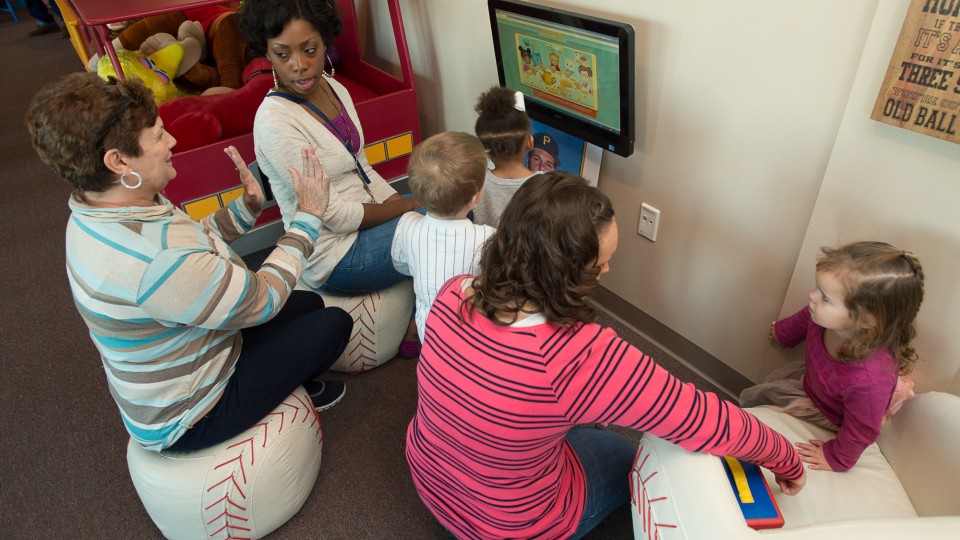Parent support groups build strong relationships
- February 6, 2017
- / Reggie Dogan
- / studer-community-institute

Parents are the most important people in a child’s life.
While most parents want to be involved and engaged early and often in their children’s growth and development, too many are unable to establish and maintain ongoing productive interaction with their little ones on a regular basis.
Some parents need intensive parenting support and others may need help in getting information and overcoming simple behavioral barriers adults face.
When a family is struggling with basic needs like food, shelter, safety and money issues, taking time to think about how to turn preparing lunch into a brain-building learn experience for baby or child or transform a family dilemma into an opportunity to model communication is asking a lot.
The support and assistance that agencies and organizations provide for parents may be the first and real opportunity they have had to put plans in action to change and improve their lives.
In my efforts to find the best model to assist and support parents and caregivers to promote the social, emotional and cognitive development of their children, I’ve found and made positive partnerships with area parent support groups whose primary goal is to provide support and information in ways that help parents become more capable and competent.
Community Action Program’s Early Head Start Parent Socialization is among them.
CAPC’s Executive Director Doug Brown has provided access to the program and invited me to share in and glean information from the parenting support sessions.
In the program team social service advocates make periodic home visits with children 0 to 3 years old and pregnant mothers.
Twice a month mothers and their children meet at A.A. Dixon Early Head Start. While the children play are together, playing and socializing, the parents meet to share and exchange information and give and receive support. The program offers assistance in parenting skills, job training and other activities to improve their lives and help their children reach developmental milestones.
The ultimate goal is to move families toward employment and empowerment through early childhood and adult education, housing and safety assistance and financial management.
The home-visiting program helps parents provide safe and supportive environments for their children.
At Pathways for Change, Executive Director Connie Bookman has resources and access to mothers and children in key demographics in east Pensacola on West Blount Street.
Many mothers and children in Sanchez, Gonzales and Attucks courts are the beneficiaries of parent support services offered by agencies, such as Community Drug and Alcohol Council’s Incredible Years.
The Family Center is a key component in Pathways for Change’s services in efforts to fight poverty, help families and improve their quality of life.
It’s open to the public to serve all eligible people regardless of race or ethnicity, sex, age, religion. Its location and availability offers a perfect avenue for SCI to step in and make a difference in the lives of mothers and children in the surrounding neighborhood.
We’ve been told over and over again how every child benefits from early learning, whether it’s practiced in a formal school setting at home with parents or caregivers or in parent support groups and home visits.
Research has consistently shown that the early years in a child’s life — when the human brain is forming — represent a critically important window of opportunity to develop a child’s full potential and shape important academic, social and cognitive skills that determine a child’s success in school and life.
But all too often the condition of some children — and their future role in society — is determined long before their first day of kindergarten.
By the time poor children are 3 years old, researchers believe they have heard on average about 30 million fewer words than children the same age from better-off families, setting back their vocabulary, cognitive development and future reading skills before the first day of school.
Those children who experience this drop in heard words are put at a disadvantage before they ever step in a classroom.
While parenting programs have sometimes failed, they can succeed if they can break down the complexity of parenting into small steps that are easy to achieve and provide continuous encouragement to parents over extended periods of time to hold their attention.
By doing so, they can tap most children’s greatest advocates and help to reduce the tremendous inequalities that children face in early learning.
When families are immersed with support and fully engaged, parent support groups build strong relationships that can help lead to long-term and lasting benefits for the children and parents.

 CivicCon launches with a look at good growth in cities
CivicCon launches with a look at good growth in cities
 Building stronger brains one baby, one parent at a time
Building stronger brains one baby, one parent at a time
 SCI debuts commercial on Early Learning City
SCI debuts commercial on Early Learning City
 Entrecon: World class speakers and an opportunity to sharpen skills
Entrecon: World class speakers and an opportunity to sharpen skills
 PYP Quality of Life survey 2017
PYP Quality of Life survey 2017
 EntreCon Pensacola 2016: A look back
EntreCon Pensacola 2016: A look back
 Leadership tip: getting better employee takeaways
Leadership tip: getting better employee takeaways
 Leadership tip: be interested instead of interesting
Leadership tip: be interested instead of interesting
 Leadership tip: delivering difficult messages
Leadership tip: delivering difficult messages
 Brain Bags boost Arc, Early Childhood Court programs
Brain Bags boost Arc, Early Childhood Court programs